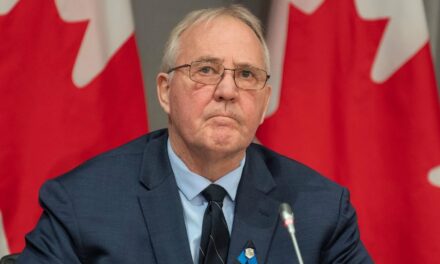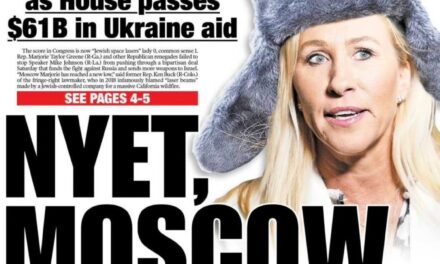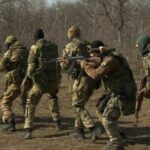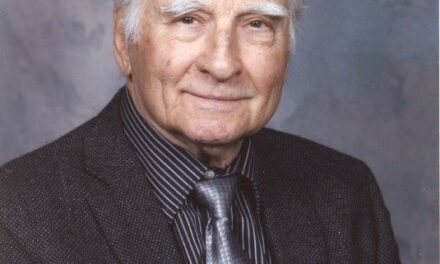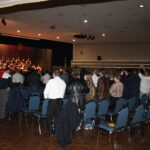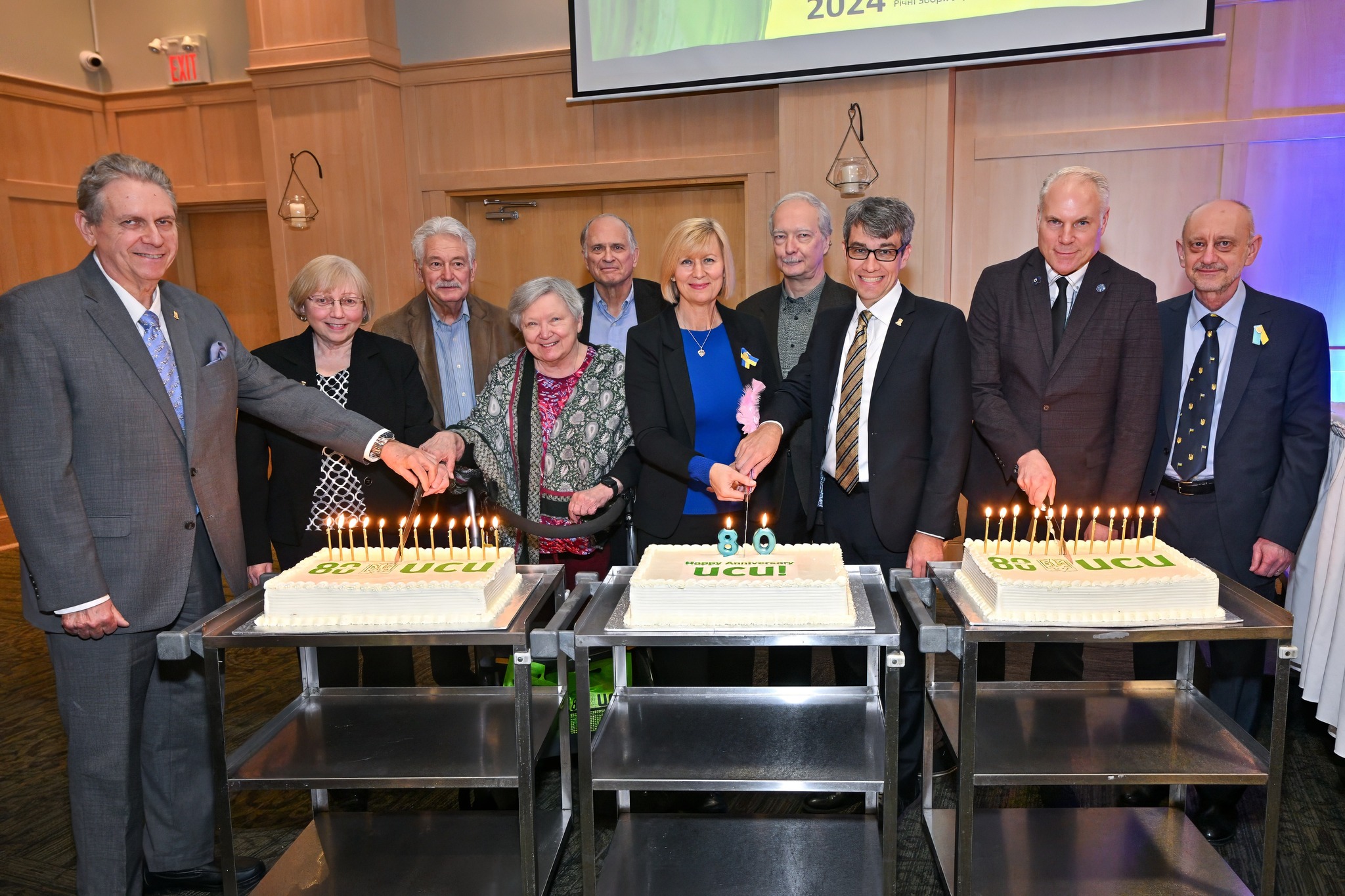Mykola Swarnyk
For NP-UN
One of the sessions of the 2023 Annual Conference of Ukrainian Journalists of North America Association was with Ambassador Kyslytsya, permanent representative of Ukraine to the United Nations. As one of the conference’s organizers and the session’s lead Michael Bociurkiw said, Kyslytsia is not a typical diplomat that we see in the corridors of the power in places like Geneva. He puts across the edgy commentary, a bit of sarcasm, his words sometimes aren’t exactly measured as we expect from someone from the typical diplomat world.
Bociurkiw’s first question to Kyslytsia was, how does he balance that kind of expectation of him being a classic diplomat with his humor, his one-liners, his sarcasm?
Kyslytsya: A few days ago, I was discussing with one American diplomat and he said, that the New York City style of diplomacy is the last bastion of classic diplomacy, which was funny to hear because of what you say about how the Ukrainian delegation behaves in the Security Council or in the General Assembly.
I think that after the Revolution of Dignity and even more so since around 2020 the Ukrainian diplomacy has shed of unnecessary attributes of standard diplomacy. And we did so because we became more pragmatic, more straightforward. We finally stopped being on three chairs at the same time. And another thing is that every Ukrainian diplomat is empowered by the feeling that morally we are right.
Bociurkiw: President Zelenskyy was just yesterday in the Middle East. I’m wondering if there any states on the margins in the Middle East that can be persuaded to join the pro-Ukrainian alliance rather than the Russia-China Axis?
Kyslytsya: We are quite dangerously very close to generalization, because if we look for example at vote on February 23rd this year, the overwhelming number of countries of the Arab Gulf voted in favor of the Resolution. However, when we look at more thematic issues for example stripping the Russian Federation of the membership rights in the Human Rights Council or the Resolution on the Registry for the compensations it’s quite a different story. The Russian Federation has been traditionally very well present on the ground there, and when you talk to many Israeli diplomats they would always say: we have to be very cautious because we have the Russian army on our borders.
Also let’s admit, that for a number of years Ukraine was not very attentive to the needs of many countries around the world. For example, when I speak about how many Ukrainian children have been killed or abducted to the Russian Federation. And when I talk to my Yemeni colleagues, they say, okay, we are very empathetic, but may I ask you where have you been when between 2015 and 2020 when eleven thousands Yemeni children were killed? Of course, it doesn’t make our case less important and valuable, but that should be also factored in when you construct your dialogue with countries concerned.
Bociurkiw: I was recently in Odesa Media Centre and I had a question: can Ukraine expect more from Israel? I think since that question was put out; they have been helping Ukraine in terms of air defense. Could we also expect the Israelis to go bomb the locations in Iran where there make the drones that are targeting Ukrainian cities?
Kyslytsya: We can and we do expect more from Israel. There are many things that general public is simply not aware of. Because in diplomacy and especially such sensitive issues as security, most of it is not public. So let me assure you that we have very intimate, if I may say, dialogue with the government of Israel. They speak to us and indeed we have to find this equilibrium between the security concerns of Israel and the defense needs of Ukraine. But I think that we are moving in the right direction. Situation in Israel is not very simple as you may know for the reasons that have nothing to do with Ukraine. In general terms, going beyond Israel, this coming fall and almost the entire next year will be very difficult from the point of view of many internal situations – be it the United States, be it Poland elections in October, be it Germany elections in October, be it Europe in general elections to the European Parliament.
Bociurkiw: One more question about the region, when I transit through places like Istanbul or Dubai, I still shake my head in disbelief of the number of Russian tourists coming. Russian aircraft on the ground there, Russian investors coming. At the G7 summit there’s a lot about plugging the holes in the sanctions package. Are we seeing any movement in terms of getting the Gulf States to not entirely ban Russians, but to crack down?
Kyslytsya: Well, first of all although there is this desire of the Gulf Countries to coordinate many things. Every single country has still their national discretion and the level of financial, political, military interest in maintaining cooperation with the Russian Federation. You can throw a tantrum and say: oh, we don’t like you and what you do, but you can stay pragmatic without breaking your moral ground or integrity and develop the cooperation and relationship with every single country based on the merits of our defense needs. The world is complicated. The General Assembly is 193 countries. And even if there are instances when we get 141, 143 votes, it does not mean that the same countries who voted against the Russian aggression would not support Russia on other agenda items.
Bociurkiw: Going back to the G7, interesting guest list – among the invitees, that are not part of the club were Indonesia, Brazil, Vietnam, South Africa, India there. But these are countries that are kind of neutral, if I can use that word, when it comes to the Ukraine conflict. Is there any movement in particular countries to join the sanctions package to full degree to really crack down on things like diamond mining, oil trading that fund Russia’s war?
Kyslytsya: Every single country that you mentioned deserves particular attention and deserves to be invited to the meetings because of their specific and important role be it in the region or in their respective continents. It’s very good that the Indian leadership is there. Our President has already met the Indian Prime Minister in India. I think Indonesia is one of the largest countries in the region. South Africa is a very difficult case, because South Africa on the one hand is a leader on the African continent, on the other hand the discussions, that we observe in South Africa between the opposition and the government including all the issues of the government’s position on the aggression, have become very heated. I remember the accusations by the American ambassador in South Africa about the shipment of weapons and ammunition to Russia, and then the investigation. Also, this initiative of a number of African leaders to mediate peace. So, I think that’s very good that those countries were invited.
Bociurkiw: I want to ask you about your situation on the Security Council: how close, do you think, we are to the restructuring of the Security Council to take in current realities?
Kyslytsya: As it stands, we are not close to restructuring of the Security Council. There is this never-ending process of intergovernmental negotiations on the reform of the United Nations and the Security Council. It is very important, that from the very outset one of the conditions of these negotiations that started long before the war was the volume and list of powers or permanent members would be not the part of the negotiations and they are not, still. There still is not a single country except Ukraine even among our closest partners, who would question the legality of the presence of the Russian Federation, because if you listen carefully to the statements made by the Baltic States, Poland, Albania they always refer to the Russian Federation as the fully fledged permanent member of this council. However, this does not and should not discourage us from maintaining the position that we believe that the Soviet seat was occupied by Russia bypassing all regulations. At the end of March my colleague from the United States Ambassador Linda Thomas-Greenfield gave an interview, and she said that Russia should not be in the Security Council in the first place. Which was already an evolution if not the revolution of the American position. However, than she continued the sentence after the comma and she said: but Russia is a permanent member of the Security Council and we cannot do anything about it. Nevertheless, I believe that when Russia is militarily, and what is important, not only militarily, but politically defeated, as the regime, the issue of the presence of the Russian Federation in the Security Council can come up and be on the table. However, I have to immediately warn you that it may be the same format and in the same context as it was in December 1991, when the transfer of the Soviet seat to the Russian Federation was facilitated by the assurances of the president Yeltsin that the Russian Federation will take control of the nuclear arsenal and the Soviet debts. So, I am afraid, that whoever comes next and will be representing Moscow – be the transitional government, be it a new government in Russia – they will continue this posture, they will continue to assure other permanent members that they will ensure full control of the Russian nuclear arsenal and the Russian debts. And that will be the same card in the game, as it was in the 1991.
Bociurkiw: 298 innocent souls perished in in the MH-17 crash where Russia targeted the Boeing 777 flight between Amsterdam and Kuala Lumpur. Four people charged, three Russians, one Ukrainian national. All of them out of the reach of the law at the moment, believed to be in Russia, or Russia-controlled territory. Can we expect any of them or the hundreds, perhaps thousands of people, Russians, suspected war criminals ever to spend one day behind bars? Can we even look to the day, when Vladimir Putin will be seen in the orange jumpsuit behind bars in the Hague?
Kyslytsya: I think that we can and more importantly we should expect, but there is a very high probability that they will be assassinated by the regime, when the regime in Moscow realizes that it’s over. So, it is basically in their interest, if they want to survive – to surrender and find the way how to defect to the West and spend the reminder of their lives, in prison in the Netherlands or wherever else.
Share on Social Media







